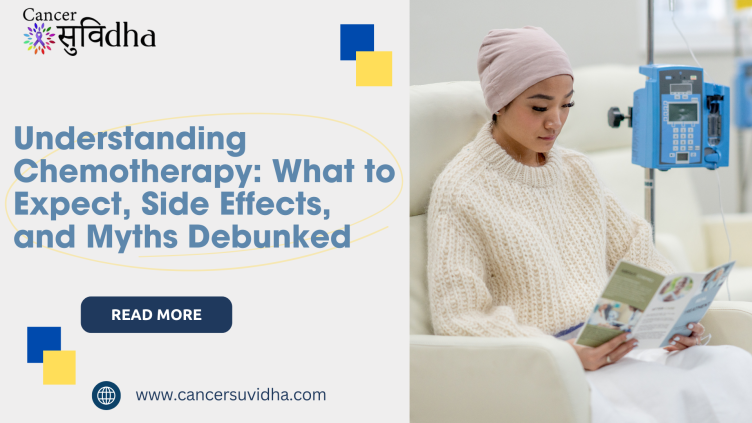Blog Details

Understanding Chemotherapy: What to Expect, Side Effects, and Myths Debunked
Chemotherapy is a well-known cancer treatment, but many people feel unsure or scared about what it involves. This blog explains chemotherapy in simple language, covering what happens during treatment, common side effects, and clearing up misunderstandings. Whether you’re preparing for chemotherapy or supporting someone who is, this guide will help you feel more confident and informed.
What is chemotherapy?
Chemotherapy (often called “chemo”) uses strong medicines to kill cancer cells or stop them from growing. It can be given in different ways: through a needle into your vein (IV), as pills, or through injections. Doctors use chemotherapy for many reasons—to shrink tumors before surgery, destroy leftover cancer cells after surgery, or slow cancer growth when a cure isn’t possible.
What to Expect During Treatment
Your chemotherapy plan depends on your type of cancer, health, and goals. Treatments might happen in a hospital, clinic, or even at home. Here’s what usually happens:
Preparation: Your doctor will run tests to decide the best chemo drugs for you. You might also get tips to prepare, like eating well or arranging rides to appointments.
Treatment Sessions: Chemo can take minutes or hours. You might sit in a comfortable chair while the medicine drips into your arm. Some people feel nervous, but nurses are there to help you relax.
Frequency: Treatments are often spread over weeks or months. This gives your body time to recover between sessions.
Common Side Effects
Chemo affects fast-growing cells, which includes cancer cells—but also healthy cells like hair and stomach lining. This causes side effects. *Not everyone gets the same ones*, and many can be managed.
Tiredness: Feeling exhausted is normal. Rest when you need to, and don’t push yourself too hard.
Nausea: Anti-sickness medicines can help. Eating small, bland meals (like toast or crackers) might ease your stomach.
Hair Loss: Not all chemo causes hair loss, but if it does, it usually grows back after treatment. Some people use scarves or wigs to feel more comfortable.
Weaker Immune System: Chemo can lower your ability to fight infections. Wash hands often and avoid crowded places when possible. Your healthcare team will help you handle these issues. Always tell them how you’re feeling—they can adjust your treatment or suggest solutions.
Debunking Chemotherapy Myths
Myth 1: “Chemo is always unbearable.”
While chemo can be tough, modern medicine has improved side effect management. Many people work, exercise, and spend time with family during treatment.
Myth 2: “If you need chemo, the cancer is terminal.”*
Chemo is used for many reasons, including curing cancer. Even when a cure isn’t possible, it can help people live longer or ease symptoms.
Myth 3: “Natural remedies are better than chemo.”*
No herbal or alternative treatment can replace chemo for fighting cancer. Always talk to your doctor before trying supplements, as some can interfere with treatment.
Conclusion
Chemotherapy can feel overwhelming, but knowing what to expect makes it easier. Remember, side effects are manageable, and your medical team is there to support you. Don’t let myths add to your worries—ask questions and focus on taking things one step at a time. With the right care and information, you can navigate this journey with strength and hope.
FAQs
Q1: Will I lose all my hair?
A1: Not always. Some chemo drugs cause hair loss, while others don’t. Ask your doctor what to expect.
Q2: Can I work during chemo?
A2: Many people work part-time or from home. It depends on your energy levels and job demands.
Q3: How long do side effects last?
A3: Most side effects fade after treatment ends. Some, like fatigue, might linger for months.
Q4: Is chemo painful?
A4: The IV needle might pinch, but the medicine itself shouldn’t hurt. Let your nurse know if you feel discomfort.
